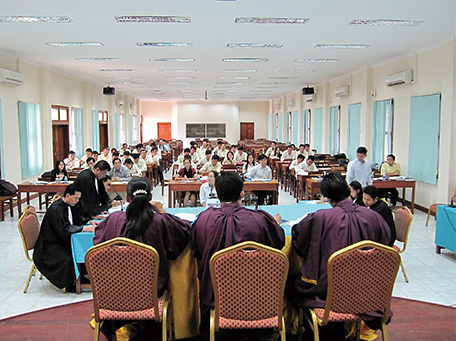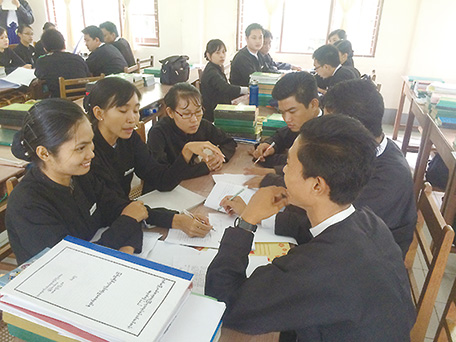(4) Policy Formulation and Institution Building
For the sustainable growth of developing countries, not only the establishment of the socio-economic infrastructure, but also the policy formulation, institution building, and human resources development are important. It is essential to support the eradication of corruption, reforming legal and institutional systems, the improvement of the efficiency and transparency of public administration, and the strengthening of the administrative capacity of local governments.
< Japan's Efforts >

A scene from a mock trial by trainees of judges and public prosecutors, held at the Royal Academy For Judicial Profession in Cambodia. (Photo: JICA)
As part of its support for policy formulation and institution building, Japan provides assistance for development of the legal system. Improvement of the legal system serves as the foundation for development of a country through self-help efforts that are based on good governance. Assistance for this sector is a typical example of person-to-person cooperation between Japan and the recipient countries, such as Indonesia, Viet Nam, Myanmar, Mongolia, Cambodia, Laos, Uzbekistan and Bangladesh, and plays a role in the “the Visibility of Japanese Aid.”
In addition, improvement of the legal systems in developing countries through such measures is an important effort in the sense that it will also improve the business environment there for Japanese companies. Japan's assistance for the improvement of legal systems draws on Japan's “soft power.” The assistance promotes and underpins the growth of the world, including Asia.
Moreover, for the democratic development of developing countries, Japan provides support for institution building and the strengthening of legal, judicial, administrative, public service, and police systems, the implementation of democratic elections, the strengthening of civil society, and the improvement of the status of women. Japan also provides support for the prevention of corruption, the development of statistical capabilities, and the enhancement of the abilities of local governments.
For the issues of criminal justice, Japan also sponsors training and seminars for professionals in the criminal justice field from developing countries in Asia and the Pacific through the United Nations Asia and Far East Institute for the Prevention of Crime and the Treatment of Offenders (UNAFEI). Training provided by UNAFEI includes those concerning the treatment of female criminals with regard to human rights considerations.
In the area of capacity building of police agencies that constitute a cornerstone in maintenance of domestic security, Japan provides support with a combination of the transfer of the knowledge and technology based on the track records and experiences of the Japanese police in international cooperation, and provision of equipment and maintenance of facilities, while emphasizing the development of human resources, including improvement of systems and enhancement of administrative capabilities. The National Police Agency (NPA) dispatches experts to and accepts trainees mainly from Asian countries such as Indonesia and the Philippines. Through this cooperation, Japan strives to transfer the attitudes, investigative abilities, and forensics technology of the democratically controlled Japanese police, who are trusted by the Japanese people.
| Myanmar
The Project for Capacity Development of Legal, Judicial and Relevant Sectors in Myanmar
Technical Cooperation Project (November 2013 – Ongoing)
In Myanmar, various reforms have been actively promoted since the inauguration of the new administration in 2011. The establishment of the rule of law through legal and judicial reforms is essential for promoting such reforms. In particular, it is an urgent task to develop legal and judicial systems for transitioning to a market economy and improving the investment environment.
The existing laws in Myanmar include many laws with content that no longer corresponds with the more complex and advanced market economy that exists today. In addition, due to the ad-hoc development of laws and regulations, the whole legal system is not systematized, and contradictions and overlaps are found between laws. Such issues are undermining the transparency and predictability of the legal system that is necessary to consider investment and business in Myanmar.
The relevant ministries and government offices with jurisdiction over legislation lack staff who have expertise in drafting laws. Moreover, there are limited opportunities for training on legislation drafting. Even at the Union Attorney General's Office (UAGO), which is responsible for conducting assessment and giving advice on legislation drafting, training that deals with the aforementioned issues is not fully integrated into the training programs. Thus, opportunities to gain specialized knowledge and know-how are limited.
Under such circumstances, the project for capacity development of legal, judicial, and relevant sectors was started. It aims to improve organizational and human resource capacities of the legal and judicial agencies in Myanmar (UAGO and the Supreme Court of the Union (SC)) to be able to develop and properly enforce laws suited to the needs of the times, society and international standards.

Training of new judges at the supreme court of Myanmar. JICA long-term experts conduct lectures on criminal laws for new judges. (Photo: JICA)
This project implements activities that address issues related to the drafting and revision of economic and other laws that Myanmar is facing, while improving the capacity of relevant ministries and government offices in legislation preparation as well as the capacity of UAGO to assess and give advice on legislation. The project also reviews, from mid- to long-term perspectives, the foundation for the development of human resources, consistency and systematization among laws and regulations, and the order of priority of lawmaking. By doing so, it will aim to contribute to the autonomous and sustainable development and proper enforcement of laws in the future, as well as the establishment of the rule of law, democratization, and economic reform.
Specifically, three long-term experts have been assigned to Nay Pyi Daw to implement various activities, such as holding seminars on intellectual property and arbitration laws, and giving lectures during the training of new judges at SC, so that UAGO and SC personnel can develop perspectives required for preparing and assessing legislation.
(As of August 2014)
